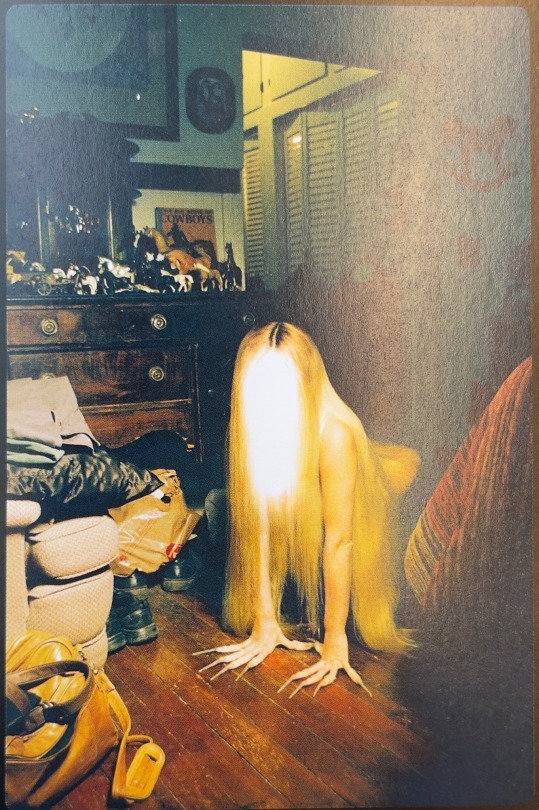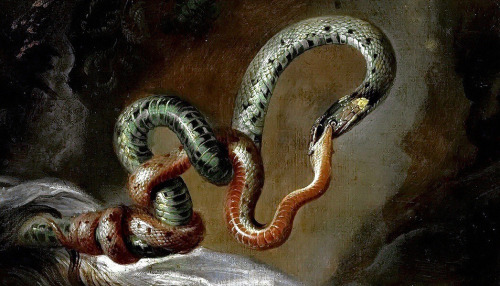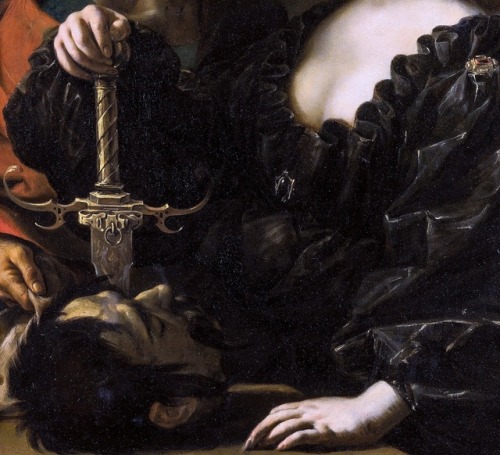@onpyre Asked If I Knew Any Books About Monster Theory, And I Decided To Share My List With Everyone.
@onpyre asked if I knew any books about monster theory, and I decided to share my list with everyone. I haven’t read all of these, so please let me know if any of them is absolute crap.
Monster Theory: Reading Culture, ed. Jeffrey Jerome Cohen (particularly his ‘Seven Theses’)
The Monster Theory Reader, ed. Jeffrey Andrew Weinstock (great introduction to a lot of different texts and ways of approaching this kind of study, so big rec!)
Ten Theses on Monsters and Monstrosity, Allen S. Weiss + this lecture
The Ashgate Research Companion to Monsters and the Monstrous, ed. Asa Simon Mittman and Peter Dendle (particularly the introduction)
Monsters, John Michael Greer
Monsters: Evil Beings, Mythical Beasts, and All Manner of Imaginary Terrors, David D. Gilmore
Horror and the Holy: Wisdom-Teachings of the Monster Tale, Kirk J. Schneider
On Monsters: An Unnatural History of Our Worst Fears, Stephen T. Asma
Other related resources:
A Philosophical Enquiry into the Origins of our Ideas of the Sublime and the Beautiful, Edmund Burke (here)
The Uncanny, Sigmund Freud (here)
Abnormal, Michel Foucault (here)
Powers of Horror: Essays on Abjection, Julia Kristeva
The Monstrous-Feminine, Barbara Creed
Holy Monsters, Sacred Grotesques: Monstrosity and Religion in Europe and the United States, ed. Michael E. Heyes
The Monster Show. A Cultural History of Horror, David J. Skal
Strangers, Gods and Monsters: Interpreting Otherness, Richard Kearney
Our Vampires, Ourselves, Nina Auerbach
Of Giants: Sex, Monsters, And The Middle Ages, Jeffrey Jerome Cohen
Frankenstein and the Language of Monstrosity, Fred Botting (here)
Theses on Monsters, China Miéville (here)
More Posts from Ro0hafz4 and Others


gdrive link where you can find free books regarding Palestine, liberation and orientalism to download and read
Do you have a list or something of your favourite academic/theory books? 🥺
sure! all of them should be available on libgen, so enjoy 🧚🏻♀️ i did focus on cultural histories rather than theory, though, otherwise it would get too long. virtually all of them are published by the academic presses, and well-sourced and peer-reviewed. no pseudoscience in this household, no sirree! (also, none of them have anything to do with my actual field of study. i’m just like that)
— Medieval Ghost Stories: An Anthology of Miracles, Marvels and Prodigies, — Fallen Bodies: Pollution, Sexuality, and Demonology in the Middle Ages, — After Lives: A Guide to Heaven, Hell, and Purgatory, — Darkness: A Cultural History, — Eccentricity and the Cultural Imagination in Nineteenth-Century Paris, — Angels & Angelology in the Middle Ages, — Enchanted Europe: Superstition, Reason, and Religion 1250-1750, — Bedeviled: A Shadow History of Demons in Science, — The Extraordinary and the Everyday in Early Modern England, — Landscapes of Fear, — Strangers, Gods and Monsters: Interpreting Otherness, — The Severed Head: Capital Visions, — Gothicka: Vampire Heroes, Human Gods, and the New Supernatural, — Frauds, Myths, and Mysteries: Science and Pseudoscience in Archaeology, — When the Dead Rise: Narratives of the Revenant, from the Middle Ages to the Present Day, — Mystics and Messiahs: Cults and New Religions in American History, — Religion and Its Monsters, — On Monsters: An Unnatural History of Our Worst Fears, — The Prince of Darkness: Radical Evil and the Power of Good in History, — Visions of the End: Apocalyptic Traditions in the Middle Ages, — Medieval Robots: Mechanism, Magic, Nature, and Art, — Gods and Robots: Myths, Machines, and Ancient Dreams of Technology, — From Gods to God: How the Bible Debunked, Suppressed, Or Changed Ancient Myths and Legends, — A Cabinet of Byzantine Curiosities: Strange Tales and Surprising Facts from History's Most Orthodox Empire, — Women Who Fly: Goddesses, Witches, Mystics, and Other Airborne Females, — The Spectral Arctic: A History of Dreams and Ghosts in Polar Exploration, — Strange Histories: The Trial of the Pig, the Walking Dead, and Other Matters of Fact from the Medieval and Renaissance Worlds, — Discerning Spirits: Divine and Demonic Possession in the Middle Ages, — Grimoires: A History of Magic Books, — Dark Tongues: The Art of Rogues and Riddlers,
etc, etc, etc.
But our notebooks give us away, for however dutifully we record what we see around us, the common denominator of all we see is always, transparently, shamelessly, the implacable “I.” We are not talking here about the kind of notebook that is patently for public consumption, a structural conceit for binding together a series of graceful pensées; we are talking about something private, about bits of the mind’s string too short to use, an indiscriminate and erratic assemblage with meaning only for its maker. And sometimes even the maker has difficulty with the meaning.
Joan Didion, from On Keeping A Notebook in: Slouching Towards Bethlehem

I’ve been listening to “Blood Moon” by Saint Sister a lot this season and it inspired this piece of a spooky Minoan Artemis dancing in the woods.
“The manifold self-contradictions in Greek ideas and phrasing about death are not errors. They are styles of imagining the unimaginable, and are responsive both to personal needs and to old conventions. The same conflicts surge up in many cultures. They are necessary ambiguities in a realm of thinking where thinking cannot really be done, and where there is no experience.”
— Emily Vermeule, “Immortals are Mortal, Mortals Immortal,” Aspects of Death in Early Greek Art and Poetry
As with most female horror fans, people love to ask me what it is I get out of horror. I give them the stock answers: catharsis, empowerment, escapism and so on. Less easy to explain is the fact that I gravitate toward films that devastate and unravel me completely – a good horror film will more often make me cry than make me shudder.
Kier-La Janisse, House of Psychotic Women
Source: Redefining Ancient Orphism: A Study in Greek Religion by Radcliffe G. Edmonds
FASCINATING stuff where this scholar on orphism argues that several texts on persephone explicitly (and the homeric hymn implicitly) claim that mortals pay the recompense (ποινη) for the grief (πενθος) that persephone underwent at her abduction. not hades, but mortals try to appease the goddess for her mistreatment, and in return they earn her favour and a blessed afterlife (or even next life). there's this irreconcilable problem here in that hades was culturally justified, but persephone as a goddess still warrants respect/pity/appeasement, and so mortals through rites and sacrifices console her.
-
 raraeavesmoriendi reblogged this · 1 month ago
raraeavesmoriendi reblogged this · 1 month ago -
 talishepard liked this · 1 month ago
talishepard liked this · 1 month ago -
 thornswithroses reblogged this · 1 month ago
thornswithroses reblogged this · 1 month ago -
 iwillgiveurest reblogged this · 1 month ago
iwillgiveurest reblogged this · 1 month ago -
 thornswithroses liked this · 2 months ago
thornswithroses liked this · 2 months ago -
 greencabarette liked this · 2 months ago
greencabarette liked this · 2 months ago -
 thelonelywiz liked this · 3 months ago
thelonelywiz liked this · 3 months ago -
 smolilies reblogged this · 3 months ago
smolilies reblogged this · 3 months ago -
 mcr-2003 liked this · 3 months ago
mcr-2003 liked this · 3 months ago -
 ro0hafz4 reblogged this · 6 months ago
ro0hafz4 reblogged this · 6 months ago -
 poisondartlesbian liked this · 7 months ago
poisondartlesbian liked this · 7 months ago -
 kaleb-is-definitely-sane reblogged this · 7 months ago
kaleb-is-definitely-sane reblogged this · 7 months ago -
 kaleb-is-definitely-sane liked this · 7 months ago
kaleb-is-definitely-sane liked this · 7 months ago -
 cunt-recesses liked this · 8 months ago
cunt-recesses liked this · 8 months ago -
 sandovers liked this · 8 months ago
sandovers liked this · 8 months ago -
 nerdsgaysandarcherybabes liked this · 1 year ago
nerdsgaysandarcherybabes liked this · 1 year ago -
 madreabeja liked this · 1 year ago
madreabeja liked this · 1 year ago -
 ffionfables liked this · 1 year ago
ffionfables liked this · 1 year ago -
 imsoooresourceful reblogged this · 1 year ago
imsoooresourceful reblogged this · 1 year ago -
 fakeaguscholar reblogged this · 1 year ago
fakeaguscholar reblogged this · 1 year ago -
 francisfelidae reblogged this · 1 year ago
francisfelidae reblogged this · 1 year ago -
 electronicmemory liked this · 1 year ago
electronicmemory liked this · 1 year ago -
 aelia-aelia liked this · 1 year ago
aelia-aelia liked this · 1 year ago -
 loversrelief reblogged this · 1 year ago
loversrelief reblogged this · 1 year ago -
 sunprophets reblogged this · 1 year ago
sunprophets reblogged this · 1 year ago -
 rizblogs reblogged this · 2 years ago
rizblogs reblogged this · 2 years ago -
 pjoandotherfandoms liked this · 2 years ago
pjoandotherfandoms liked this · 2 years ago -
 hannibalmeow liked this · 2 years ago
hannibalmeow liked this · 2 years ago -
 abigsigh reblogged this · 2 years ago
abigsigh reblogged this · 2 years ago -
 oedipalcomplexes reblogged this · 2 years ago
oedipalcomplexes reblogged this · 2 years ago -
 malinaa reblogged this · 2 years ago
malinaa reblogged this · 2 years ago -
 endlessshelf reblogged this · 2 years ago
endlessshelf reblogged this · 2 years ago -
 halah1990 liked this · 2 years ago
halah1990 liked this · 2 years ago -
 hineinihineini-moving liked this · 2 years ago
hineinihineini-moving liked this · 2 years ago -
 devotionfm liked this · 2 years ago
devotionfm liked this · 2 years ago -
 fionasjoanofarcphotoshoot reblogged this · 2 years ago
fionasjoanofarcphotoshoot reblogged this · 2 years ago -
 fionasjoanofarcphotoshoot liked this · 2 years ago
fionasjoanofarcphotoshoot liked this · 2 years ago -
 deanmarywinchester liked this · 2 years ago
deanmarywinchester liked this · 2 years ago -
 skeetsie liked this · 2 years ago
skeetsie liked this · 2 years ago -
 gamajun liked this · 2 years ago
gamajun liked this · 2 years ago -
 legrandmeavlnes reblogged this · 2 years ago
legrandmeavlnes reblogged this · 2 years ago -
 letsjustgetout liked this · 2 years ago
letsjustgetout liked this · 2 years ago -
 lefilledesoleil liked this · 2 years ago
lefilledesoleil liked this · 2 years ago -
 thedaywedied liked this · 2 years ago
thedaywedied liked this · 2 years ago -
 legrandmeavlnes liked this · 2 years ago
legrandmeavlnes liked this · 2 years ago -
 allthestoriescantbelies liked this · 2 years ago
allthestoriescantbelies liked this · 2 years ago -
 quarantinegirlsummer liked this · 2 years ago
quarantinegirlsummer liked this · 2 years ago





